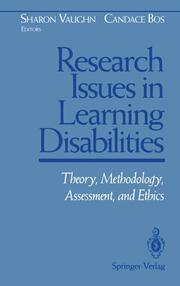Detailansicht
Research Issues in Learning Disabilities
Theory, Methodology, Assessment, and Ethics
ISBN/EAN: 9781461383475
Umbreit-Nr.: 4371624
Sprache:
Englisch
Umfang: xiii, 351 S.
Format in cm:
Einband:
kartoniertes Buch
Erschienen am 08.11.2011
Auflage: 1/1994
- Zusatztext
- In this chapter, we described issues in conducting intervention research with students with learning disabilities on the secondary level. We main tained that interventions should be well-grounded in theories of learning as well as characterizations of learning disabilities (Pressley, Scruggs, & Mastropieri, 1989); that they should first be conducted in a series of highly controlled, laboratory-like experiments to carefully assess the potential utility of the intervention; and that, if the intervention is suc cessful in highly controlled settings, it should then be evaluated in class room applications. We maintained that research designs should evolve as the research questions become more applied, and that the results of laboratory research should be used to support the findings of classroom applications. Finally, we described several research designs that we have found useful in conducting classroom intervention research. There is a great deal more to conducting intervention research, of course, than experimental or quasi-experimental design. Intervention strategies likely to be effective must be identified, relevant literature must be reviewed, experimental materials must be developed, and cooperative schools, teachers, parents, and students must be located. Nevertheless, inadequate research designs can invalidate the best and most successful efforts in all of these areas, while effective and practical research designs can do much to document the best practices and advance our knowledge of effective interventions with students with learning disabilities. References Brigham, F. J., Scruggs, T. E., & Mastropieri, M. A. (1992).
- Autorenportrait
- InhaltsangabeI Models and Theories.- 1 Learning Disabilities Theory: Issues and Advances.- Issues in the Development and Validation of Learning Disabilities Theory.- Important Elements of Learning Disabilities Theory.- Current Theories of Learning Disabilities.- References.- 2 Neuropsychological Theories Associated with Learning Disorders.- Anatomical and Behavioral Differences.- Contemporary Theories Associated with Learning Disorders.- The Promise of the Future.- References.- 3 Models and Theories: Their Influence on Research in Learning Disabilities.- Paradigm Wars in Learning Disabilities.- Research Wars in Learning Disabilities.- The Scientific Method.- The Scientific Method and Learning Disabilities: Summary and Conclusions.- References.- II Methodological Issues: Descriptive Research.- 4 The Role of Classification in Learning Disabilities.- Conceptual Issues in Classification.- Methodological Issues in Cluster Analysis.- Conclusions.- References.- 5 A Screening Test Built of Cognitive Bricks: Identification of Young LD Children.- Development of a Cognitive Screening Test: Initial Results.- Summary and Implications for Future Research.- References.- III Methodological Issues: Intervention Research.- 6 Instructional Issues in Conducting Intervention Research at the Elementary Level.- Conceptual Paradigms for Conducting Intervention Research.- Dimensions of Intervention Research.- Changing the Character of Intervention Research: A Personal Case Study.- References.- 7 Issues in Conducting Intervention Research: Secondary Students.- Problematic Designs.- Programmatic Intervention Research.- Summary.- References.- 8 Cognitive Strategy Instruction: Methodological Issues and Guidelines in Conducting Research.- Issues.- Cognitive Strategy Instruction in the Schools.- A Final Comment.- References.- IV Methodological Issues: Case Study, Qualitative, and Longitudinal.- 9 Using Single-Subject Research Methodology to Study Learning Disabilities.- Relevance to Learning Disabilities.- Developments in Design.- Generality of Findings.- Summary.- References.- 10 Qualitative Research and Learning Disabilities.- What is Qualitative Research?.- Designing a Study.- Conducting a Study.- Future Directions for Research.- References.- 11 Methodological Issues in Longitudinal Research On Learning Disabilities.- Definition, Purpose, and Design of Longitudinal Research.- The Purposes of Longitudinal Research.- Types of Longitudinal Designs.- Longitudinal Data Analysis.- Factors that Impede Longitudinal Research.- Conclusion.- References.- V Assessment and Instrumentation.- 12 Academic Assessment and Instrumentation.- The Relationship of the Measure to the Nature of the Treatment.- The Distinction between Content Coverage and Content Mastery.- Importance of the Scoring Unit to Enhance Sensitivity to Growth.- Summary Remarks.- References.- 13 The Study of Cognitive Processes in Learning Disabled Students.- Global Processes and Structures.- Cognitive Correlates.- Domain-Specific Processes.- Stage and Sequence of Processing.- Summary and Conclusion.- References.- 14 Social Assessments of Students with Learning Disabilities: Do They Measure Up?.- Peer Reports: Ratings and Nominations of Social Competence.- Observation of Social Behavior.- Social Self-Report as a Measure of Social Functioning.- References.- VI Ethical Issues.- 15 Ethical Considerations When Conducting Research with Students with Learning Disabilities.- Ethical Issues Related to the Treatment and Identification of Subjects.- Ethical Issues Related to the Beliefs and Attitudes of the Investigator.- Ethical Issues Related to Measurement.- Ethical Issues Related to Intervention.- Summary and Conclusions.- References.- 16 Ethical Issues Related to Translating Research in Learning Disabilities into Practice.- Do Researchers Have a Role to Play in Product Development? 331 The Importance of Researchers Adopting an Ethical Perspective.- Factors that Promote the Translation of Research to Practice in an Ethical
